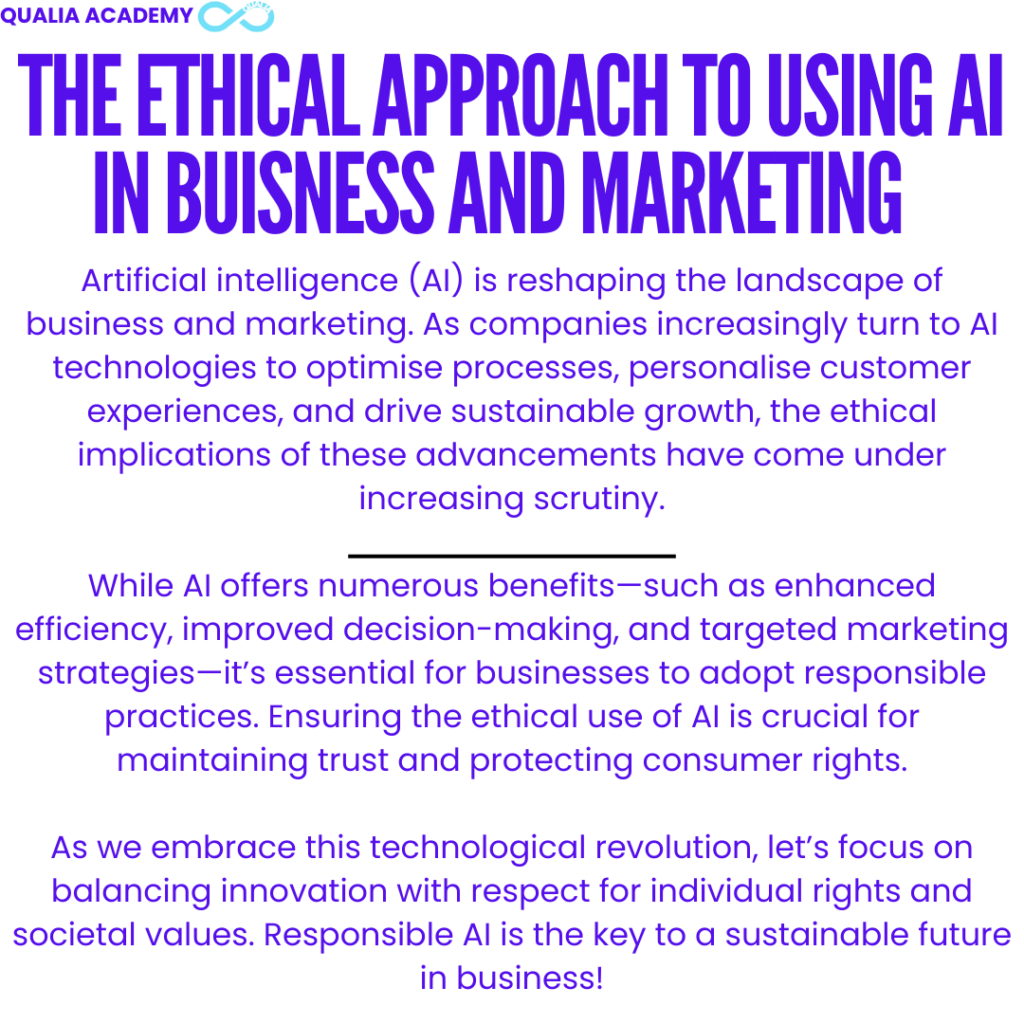Artificial intelligence (AI) has become a transformative force in the world of business and marketing. As companies increasingly rely on AI technologies to optimise processes, personalise customer experiences, and drive growth, questions about the ethical implications of these advancements have grown louder. While AI offers many benefits, businesses must adopt responsible practices to ensure its deployment is both effective and ethical.

In this blog, we will explore the ethical approach to using AI in business and marketing. We will examine the key ethical considerations, potential challenges, and practical strategies for businesses looking to harness AI responsibly. At the heart of this discussion is the importance of balancing technological innovation with respect for individual rights and societal values.
AI in Business: A Game-Changer with Ethical Concerns
The rapid development of AI technologies has revolutionised how businesses operate. From automating routine tasks to analysing large volumes of data, AI allows companies to improve efficiency, reduce costs, and enhance customer experiences. In the marketing realm, AI-powered tools can help businesses personalise advertisements, predict consumer behaviour, and even generate content.
Despite these benefits, the rise of AI in business comes with ethical challenges that cannot be ignored. The potential for misuse, bias, data privacy concerns, and transparency issues raises questions about the responsible use of AI in business contexts.
The ethical approach, therefore, must go beyond the technological capabilities of AI and focus on safeguarding human rights, ensuring fairness, and maintaining trust between businesses and consumers.
Key Ethical Considerations for AI in Business
When integrating AI into business and marketing strategies, companies must navigate several ethical considerations. These include:
Bias and Fairness
One of the most pressing concerns regarding AI in business is the risk of bias. AI systems learn from data, and if the data used to train these systems is biased, the resulting decisions may perpetuate or even exacerbate existing inequalities. For instance, an AI-powered recruitment tool may unintentionally favour certain demographics if the training data reflects historical biases in hiring.
To address this, businesses must ensure that their AI systems are trained on diverse, representative data sets. Regular audits and evaluations should also be conducted to identify and rectify any biases that may emerge. Fairness should be a central goal in the design and deployment of AI in business, particularly in industries such as finance, healthcare, and marketing, where AI-driven decisions can have profound societal impacts.
Transparency and Accountability
AI algorithms are often perceived as “black boxes” due to their complexity, making it difficult for people to understand how decisions are made. This lack of transparency can undermine trust in AI systems, especially in sectors where decisions have significant consequences, such as lending, insurance, or medical diagnoses.
Businesses using AI should strive for transparency by providing explanations for how their AI systems work and how decisions are made.
This is particularly important in marketing, where personalised advertisements and content recommendations may raise concerns about manipulation or invasion of privacy. Organisations should also implement clear accountability structures to ensure that someone is responsible for the outcomes produced by AI systems.
Data Privacy and Security
AI systems rely on vast amounts of data to function effectively. In the business context, this often includes sensitive customer data, such as purchasing histories, online behaviour, and personal information. The ethical use of AI in business must, therefore, prioritise data privacy and security.
Companies should implement strong data protection measures to safeguard customer information from misuse or breaches. Moreover, they must ensure compliance with relevant privacy regulations, such as the General Data Protection Regulation (GDPR) in Europe. Transparent data collection practices, where customers are fully informed about how their data is being used, are also essential for maintaining trust.
Informed Consent and Autonomy
AI technologies often rely on data collected from individuals, either directly (through user interactions) or indirectly (via third-party data sources). In many cases, individuals may not fully understand how their data is being collected or how it will be used. This raises ethical concerns about autonomy and informed consent.
Businesses must ensure that individuals are given clear, accessible information about how AI systems will use their data. Consent should be freely given, specific, and informed, in line with legal and ethical standards. In marketing, this is particularly crucial, as the use of AI to personalise content or predict consumer behaviour can feel intrusive if not properly explained.
Impact on Employment
As AI becomes more prevalent in business, concerns about its impact on employment have grown. Automation, driven by AI, has the potential to displace jobs, particularly in industries that rely heavily on manual or routine tasks.
While AI can create new opportunities in areas such as AI development and data analysis, businesses must consider the broader societal impact of AI-driven automation.
A responsible approach to AI in business should include strategies for workforce transition, such as reskilling and upskilling initiatives. By investing in employee training, businesses can help mitigate the negative effects of AI on employment and ensure that workers are prepared for the jobs of the future.
Ethical Marketing and Consumer Manipulation
In the realm of marketing, AI-powered tools enable businesses to target consumers with personalised advertisements and content. While this can enhance customer experiences, it also raises ethical questions about manipulation.
AI systems can analyse consumer data to predict behaviour and preferences with incredible accuracy, potentially leading to exploitative practices that prey on consumers’ vulnerabilities.
Ethical marketing involves using AI to enhance value for customers without crossing the line into manipulation. This requires a delicate balance between personalisation and respect for consumer autonomy.
Businesses should avoid using AI in ways that deceive or unduly influence consumers, particularly in sensitive areas such as financial products, health services, and political advertising.
Best Practices for Ethical AI Implementation in Business
To adopt an ethical approach to using AI in business, companies should follow best practices that prioritise fairness, transparency, and respect for individual rights. Here are some key strategies:
Develop Ethical Guidelines for AI Use
Businesses should create clear ethical guidelines for AI use, outlining the principles and values that will guide AI development and deployment. These guidelines should address issues such as bias, transparency, accountability, and data privacy. By establishing a formal ethical framework, companies can ensure that AI is used responsibly and in line with their broader corporate values.
Conduct Regular Ethical Audits
Ethical considerations should not be an afterthought but an ongoing process throughout the lifecycle of an AI system. Regular ethical audits can help businesses identify potential risks and make adjustments as needed. These audits should evaluate the fairness, transparency, and privacy implications of AI systems, as well as their overall impact on stakeholders.
Foster a Culture of Ethical Responsibility
Building a culture of ethical responsibility is crucial for ensuring the long-term success of AI in business. Employees at all levels should be trained on the ethical implications of AI and encouraged to raise concerns if they observe unethical practices.
Leadership should set the tone by prioritising ethical considerations in decision-making and fostering an environment where ethics are seen as integral to innovation.
Engage with External Stakeholders
AI systems often have wide-reaching impacts beyond the businesses that deploy them. Engaging with external stakeholders, including customers, regulators, and advocacy groups, can help businesses gain valuable insights into the ethical concerns surrounding AI.
Public consultations and partnerships with ethical AI organisations can also provide guidance on best practices.
Prioritise Explainability in AI Systems
Explainability, or the ability to understand and communicate how AI systems arrive at their decisions, is critical for building trust.
Businesses should prioritise the development of AI systems that can provide clear, comprehensible explanations for their decisions. This is particularly important in industries where AI decisions have significant consequences, such as healthcare, finance, and criminal justice.
Collaborate on Industry-Wide Standards
The ethical use of AI in business is a global challenge that requires collaboration across industries and sectors. Businesses should work together to develop industry-wide standards for ethical AI use.
These standards can help establish a level playing field and ensure that companies are held accountable for their AI practices. Collaboration with regulators and policymakers is also essential to ensure that ethical guidelines are aligned with legal requirements.
Ethical AI in Action
AI in Retail: Personalisation Without Intrusion
In the retail sector, AI has been used to enhance the customer experience by offering personalised product recommendations and targeted advertisements. However, ethical concerns arise when personalisation becomes too intrusive.
One major retailer adopted an ethical approach by allowing customers to opt-in or opt-out of personalised recommendations. The company also implemented a transparent privacy policy that clearly explained how customer data would be used.
By prioritising customer autonomy and transparency, the retailer was able to build trust while still benefiting from AI-driven personalisation.
AI in Healthcare: Balancing Innovation and Privacy
The healthcare industry is another area where AI has tremendous potential but also poses significant ethical challenges. One healthcare provider used AI to analyse patient data and predict potential health risks, allowing for early intervention.
To address ethical concerns, the provider ensured that patient data was anonymised and that AI-driven recommendations were always reviewed by a human doctor. By striking a balance between innovation and privacy, the healthcare provider was able to improve patient outcomes without compromising ethical standards.
Final Thoughts on Ethical AI in Business
AI in business has the potential to drive innovation, improve efficiency, and deliver personalised experiences to customers.
However, these benefits come with ethical challenges that businesses must address to ensure responsible AI use. From bias and transparency to data privacy and consumer manipulation, the ethical considerations surrounding AI are complex and multifaceted.
By adopting a proactive and principled approach to AI, businesses can navigate these challenges while still reaping the benefits of AI technologies.
The key lies in balancing innovation with respect for individual rights, transparency, and fairness. As AI continues to evolve, the ethical approach to using AI in business will be critical to building trust, maintaining customer loyalty, and ensuring that AI serves the greater good.









